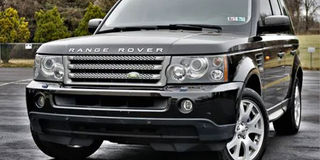Should you buy a used Range Rover?

What you need to know:
Buying a used car has a number of advantages with one being the ability to get it at a lower cost than when it is new. However, a used Range Rover might end up being more costly than you anticipated.
The Range Rover is among the world’s most desirable SUVs and falling prices mean they are now a bargain in the used car market. The third generation, first launched in 2002, remained on sale right up until 2013. While this is a longer-than-average lifespan, the Range Rover received significant updates over the years, so it is important to know which model year you are considering to ensure you get the engine, gearbox and specification you want.
Luxury car
Despite its rugged roots in Land Rover’s utilitarian heritage, this Range really cemented the model’s reputation as a luxury car and a capable off-roader. The combination of the raised driving position with the off-road ability, the luxurious interior and hugely impressive ride meant it proved hugely popular with buyers.
Buying a used car can have a lot of benefits, especially in the luxury car market. Cars such as Audi and BMW practically eat their depreciation, from the moment the first owner drives one from the dealership to every mile you add onto the odometer.
There are some luxury car brands that you can confidently buy in the used car market and avoid the depreciation, brands such as Lexus or Mercedes but there are some that you should definitely avoid, and Range Rover is one of them. So, the direct answer is no, do not buy a used Range Rover specifically the third and earlier generations.
Mechanical problems
Regardless of which model or year you choose, used Range Rovers are notorious for being unreliable and plagued with expensive repair costs. Even Rovers that appear, upon first glance, to be in exceptional or ‘like new’ condition can be hiding some nefarious mechanical problems, and there are some major problems you should be aware of if you absolutely must buy a used Range Rover.
Even seasoned Land Rover technicians such as Donald Lule from Nakawa Vocational Institute shall advise in the negative. There is usually a long list of why nots attached to that. They are expensive to repair, they break down a lot, they fall apart as you drive, they will never last and those sentiments goes on and on. See, Range Rovers, like most high-end cars, require a bit more care than your average car. Yes, you can drive a Premio until it becomes one with the Earth and practically run it out of oil and still make that drive home.
Many Range Rovers came equipped with an air suspension that, when working, gives the car a smooth ride that can be adjusted for different driving conditions. This is done through several major components that cost thousands of dollars to repair or replace. Because many Range Rovers can still be driven with many of these mechanical pieces damaged, you can buy one without realising that the suspension needs a substantial amount of work.
Latest model
With all said, the latest and the fourth-generation model from 2013 model year with a facelift in 2018, is a much better car from all stand points including exterior style, interior furnishing, driving dynamics and reliability compared to the versions that came before it.
If you are still determined to get a Range, this is the generation to go for.
Pros
While many used examples of Range Rover have some reliability issues, the strong appeal of its badge, the luxurious interior and general prestige cannot be ignored. If you can stomach the high running costs, few cars provide a greater sense of occasion than a Range Rover. The neighbours and collegues will be suitably impressed, too, even if your car did not actually cost that much to buy, especially when you consider how expensive it would have been when new.




